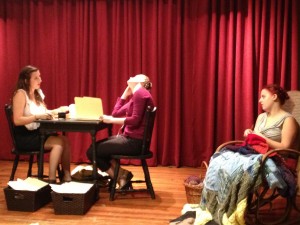On a delightfully drizzly night on Saturday, Sept. 22, a full house turned up at Writers and Books for “Threading,” a revolutionary and entertaining modern interpretation of the Three Fates, presented by The Opposite Of People (TOOP), as part of Rochester’s first Fringe Festival.
Set in a corporate office, the play chronicles the Three Fates: Lillian, played by senior Emma Caldwell, Addie, played by senior Annalise Baird and Catherine, played by Laura Nichols, ’12, as well as their infatuation with John (Jonathan Grima, ’11), a mortal they have randomly selected at birth. After cutting the thread that represents the life expectancy of said baby, the goddesses suddenly become interested in his destiny. For reasons as unfathomable as this spontaneous surge of curiosity, they decide that seven would be “a good age to intervene.”
Throughout the course of John’s life, the Fates turn themselves into female figures with whom John builds significant relationships: Catherine enjoys being an affectionate mother, Addie appears as a flirty friend and Lillian indulges in memory hopping, recreating moments of her marriage with John. The characters and audience members alike are entertained, but not Moros, played by sophormore Nate Damon, the god that, quite literally, delivers death. He finds the trio’s involvement unethical and warns them to stop repeatedly, but to no avail.
The goddesses’ emotional attachment to John accrues as his eventual demise draws closer. Finally comes the fateful night — the goddesses all show up in panic, desperate to prevent John’s death. Hilarity ensues as Lillian and Catherine struggle to explain Moros and Addies’ impromptu arrival. The stage dynamics and comic timing in this climactic scene are reminiscent of playwright Michael Frayn’s “Noises Off.”
Because this is a TOOP production, and they are known for turning typical situations on its head, one can expect that the Fates are also the opposite of their mythical counterparts. Far from the domineering crones the Greeks had in mind, these radiant young goddesses find themselves powerless and depressed after John’s life is taken. Then, to channel their residual feelings, or to cope with withdrawal, they turn to another newborn child that happens to have her thread cut that day and a new cycle begins.
Something particularly striking is the dramaturgical decision the writer, senior Kelsey Burritt, makes for characterization. The excessive humanity of the goddesses resonates with the audience well and permits humorous digressions that lend moments of relief to an overall thought-provoking and occasionally melancholic story. For example, when Addie is hit by the news that John is supposed to die that very night, her first reaction is to get a frappuccino. Lillian inquires about the specific time, which turns out to be happening concurrently with “The Bachelorette,” one of many shows that she follows religiously. Punch lines like these are sprinkled throughout the play, and the actors’ delivery is effortlessly spot-on.
Jokes aside, the theme of “Threading” is nonetheless earnest, if not grievous. As director Jessica Chinelli ’12 points out in the program, “What if we really are the play-things of Immortals? How does it affect us? And more interestingly, perhaps, how does it affect Them?”
The play implies that we human props are barely aware of the divine machinations we are involved in, whereas the Immortal puppeteers suffer a great deal from the ramifications of their own deeds. Which then prompts more questions: Why are the Fates so emotionally invested in mortals, and why is their affinity so unconditional from the very beginning? Is it just because eternity is hard to spend? It all essentially boils down to the most despairing query: are we governed by the Immortals’ whims, or even worse, their boredom?
The 45-minute play, limited in time as well as dimension, leaves these questions unanswered. One might want to embrace the pessimism and say, yes, maybe, but so what? Human interactions are, in a sense, divine as well. As long as we are under the manacles of a linear timeline, every action becomes irreversible once it is done, and there is no external force that can revoke it and liberate us from its implications. Divine or not, that is a cross we all have to bear.
Depressed yet? Here’s the moral of “Threading” that will save your day: Frappuccinos work wonders. If it solves Addie’s problem, it sure will ease your existential angst. For about five minutes anyway, until you stumble upon the next newborn mortal/metaphysical musing by chance — however, not even this sad turn can detract from the joyful experience of “Threading.”
Zheng is a member of the class of 2016.


